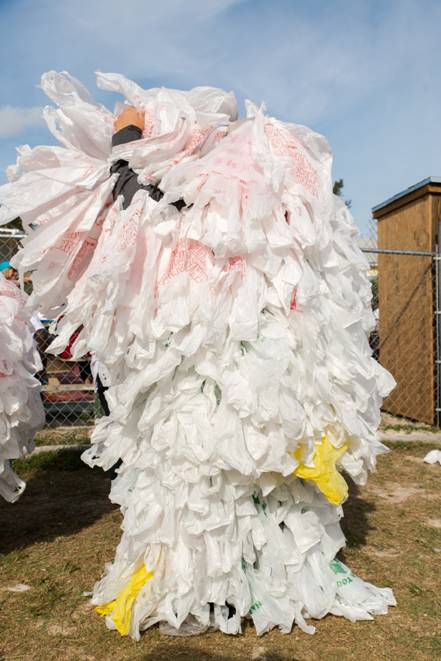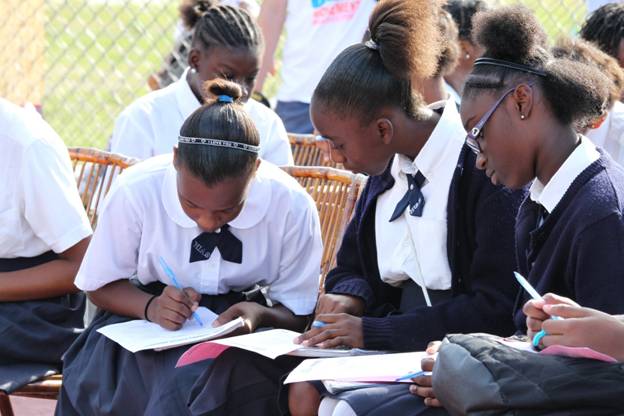For Earth Day and Coastal Awareness Month members of The Bahamas Plastic Movement visited the Harbour Island All Age School (HIAAS) on April 11, 2014 to educate students on environmental and health issues regarding plastic pollution. Plastic debris has accumulated in a variety of environments from terrestrial to the open sea and even the most remote shorelines around the world. This form of pollution has environmentally negative effects, both biologically to humans and marine life.
 The Bahamas Plastic Movement, a newly formed environmental nonprofit organization committed to raising awareness of plastic pollution partnered with Space 2 Create, a local youth organization on Harbour Island to deliver the message of REFUSING, RETHINKING, and REDUCING single use plastic items within their lives. The Plastic Pollution Seminar which was held on the school’s campus featured a unique educational approach. “We married theater with science to produce an interactive and intuitive lesson to keep students engaged and excited about this important topic” stated William Simmons, founder and director of Space 2 Create. The Bahamas Plastic Movement and Space 2 Create teams performed several skits filled with facts about plastic pollution to 150 students from grades 7-12. Students were assessed before and after the assembly via pre/post testing methods to determine how much knowledge they acquired.
The Bahamas Plastic Movement, a newly formed environmental nonprofit organization committed to raising awareness of plastic pollution partnered with Space 2 Create, a local youth organization on Harbour Island to deliver the message of REFUSING, RETHINKING, and REDUCING single use plastic items within their lives. The Plastic Pollution Seminar which was held on the school’s campus featured a unique educational approach. “We married theater with science to produce an interactive and intuitive lesson to keep students engaged and excited about this important topic” stated William Simmons, founder and director of Space 2 Create. The Bahamas Plastic Movement and Space 2 Create teams performed several skits filled with facts about plastic pollution to 150 students from grades 7-12. Students were assessed before and after the assembly via pre/post testing methods to determine how much knowledge they acquired.
Marcia Musgrove, National Coordinator of the Eco Schools Programme at BREEF informed students on the importance of whole school action for the environment. “The aim of the Eco‐Schools programme is to make environmental awareness and action an intrinsic part of the life and philosophy of schools for both pupils and staff and to engage the wider community” stated Musgrove. She encouraged students of HIAAS to establish an Eco committee that would represent the whole school and the community. Her message was well received as the principal of the high school is committed to launching the eco-schools programs during the next school year. Also in attendance during the assembly was Earleston Mcphee, Director of Sustainable Tourism at the Ministry of Tourism, along with members of the ZNS news team. Students of the Deep Creek Middle School (DCMS) Eco Club also made an appearance to educate their northern peers on initiatives performed at their school to reduce plastic waste. The students presentation was really entertaining as they orchestrated a plastic step dance and chant in addition to an interactive dance called the plastic slide. The assembly culminated with a live musical performance of Plastic State of Mind, an environmental parody of Jay-z and Alicia Keys’ hit record Empire State of Mind.
 Following the seminar, students were invited to participate in an afternoon of citizen science activities ranging from beach plastic surveys, social science surveys and roadside debris assessments. Within each activity students were tasked with investigating the pervasive nature of plastic debris through a series of data collection methods. “It is important to understand how plastic persists in our lives, on land and in our oceans. By getting students out into the field to study these first hand effects is an effective element in helping them to understand ways to mitigate the threats of plastic pollution through science”, stated Kristal Ambrose, founder and director of The Bahamas Plastic Movement. Participants were grouped into three teams where they either went to the beach to analyze plastic concentrations through the use of scientific transects, interviewed community members to get their perceptions and attitudes towards plastic pollution or examined roadside debris to determine which plastic products were most abundant.
Following the seminar, students were invited to participate in an afternoon of citizen science activities ranging from beach plastic surveys, social science surveys and roadside debris assessments. Within each activity students were tasked with investigating the pervasive nature of plastic debris through a series of data collection methods. “It is important to understand how plastic persists in our lives, on land and in our oceans. By getting students out into the field to study these first hand effects is an effective element in helping them to understand ways to mitigate the threats of plastic pollution through science”, stated Kristal Ambrose, founder and director of The Bahamas Plastic Movement. Participants were grouped into three teams where they either went to the beach to analyze plastic concentrations through the use of scientific transects, interviewed community members to get their perceptions and attitudes towards plastic pollution or examined roadside debris to determine which plastic products were most abundant.
At the end of the day the entire community of Harbour Island was invited to the Sir George W.K Roberts Memorial library for a free screening of Plastic Paradise, a documentary focused on The Great Pacific Garbage Patch. All three events, which featured both youth and adult crowds yielded lots of positive reviews and vows of reducing plastic consumption. Students and community members gained a whole new perspective on their dependence on single use plastic products and learned new ways to reduce their plastic intake. The Bahamas Plastic Movement plans to replicate this alternative learning experience across the entire Bahamas through their educational platform of creating a ‘Bahamas Free of Plastic Debris”.
